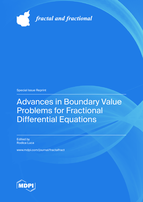Advances in Boundary Value Problems for Fractional Differential Equations
A special issue of Fractal and Fractional (ISSN 2504-3110). This special issue belongs to the section "General Mathematics, Analysis".
Deadline for manuscript submissions: closed (30 September 2022) | Viewed by 26800
Special Issue Editor
Interests: fractional differential equations; ordinary differential equations; partial differential equations; finite difference equations; boundary value problems
Special Issues, Collections and Topics in MDPI journals
Special Issue Information
Dear Colleagues,
Fractional differential equations have extensive applications in the mathematical modelling of real-world phenomena which occur in scientific and engineering disciplines. This Special Issue will cover new aspects of the recent developments in the theory and applications of fractional differential equations, inclusions, inequalities, and systems of fractional differential equations with Riemann-Liouville, Caputo, and Hadamard derivatives or other generalized fractional derivatives, subject to various boundary conditions. Problems as existence, uniqueness, multiplicity, nonexistence of solutions or positive solutions, and stability of solutions for these models are of great interest for readers who work in this field.
Prof. Dr. Rodica Luca
Guest Editor
Manuscript Submission Information
Manuscripts should be submitted online at www.mdpi.com by registering and logging in to this website. Once you are registered, click here to go to the submission form. Manuscripts can be submitted until the deadline. All submissions that pass pre-check are peer-reviewed. Accepted papers will be published continuously in the journal (as soon as accepted) and will be listed together on the special issue website. Research articles, review articles as well as short communications are invited. For planned papers, a title and short abstract (about 100 words) can be sent to the Editorial Office for announcement on this website.
Submitted manuscripts should not have been published previously, nor be under consideration for publication elsewhere (except conference proceedings papers). All manuscripts are thoroughly refereed through a single-blind peer-review process. A guide for authors and other relevant information for submission of manuscripts is available on the Instructions for Authors page. Fractal and Fractional is an international peer-reviewed open access monthly journal published by MDPI.
Please visit the Instructions for Authors page before submitting a manuscript. The Article Processing Charge (APC) for publication in this open access journal is 2700 CHF (Swiss Francs). Submitted papers should be well formatted and use good English. Authors may use MDPI's English editing service prior to publication or during author revisions.
Keywords
- fractional differential equations
- fractional differential inclusions
- fractional differential inequalities
- boundary value problems
- existence, nonexistence
- uniqueness, multiplicity
- stability






